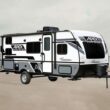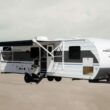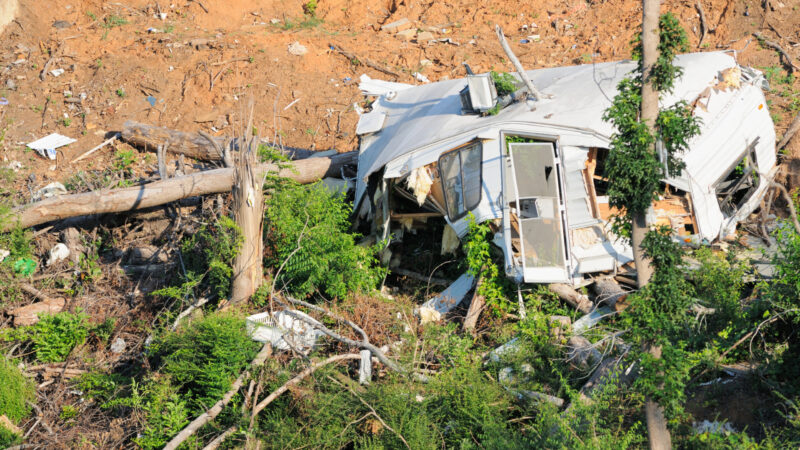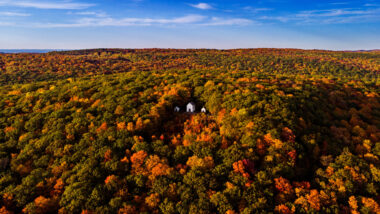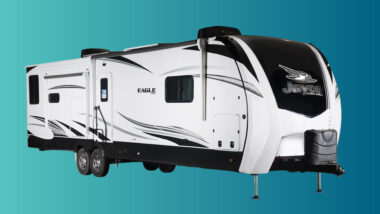Table of Contents Show
A severe storm can be scary, no matter where you’re weathering it. However, we’ve seen countless times that an RV is no place to be during Mother Nature’s fury.
Recently, we saw a camp host share about a situation in the campground where they were working. The pictures they shared demonstrate why you should think twice about seeking shelter in your rig.
Today, we’re discussing the situation and how to stay safe while RVing during severe weather.
Let’s get started!
Fallen Tree Destroys Motorhome in Arkansas
A recent storm tore the area around Branson, Missouri. Trees and limbs fell across the region. Unfortunately, one tree snapped into two pieces and crashed into an RV parked in a campground.
The individual who shared the post was the campground host. They stated the tree stood outside the campground’s property.
However, the intense winds the area experienced pushed the tree onto the campground’s property and the luxury motorhome. It fell almost perfectly in the middle of the entire length of the RV.

RVers Avoid a Certain Tragedy
Thankfully, the camp host shared that the owners weren’t home during the storm. It could have been tragic if someone had been inside. While the owners aren’t likely to travel anytime soon, the situation could have ended much worse.
We hate seeing any accidents like this involving RVs, especially for full-time travelers. However, we’re happy to hear that everyone is safe. This is a perfect reminder to take safety seriously during storms.
While the individuals in this story avoided a tragedy, you or others in similar situations may not be as lucky. You should never underestimate Mother Nature.
How to Stay Safe During Severe Weather While RVing
We want you to stay safe during severe weather while RVing. Here are several things you can do to avoid a tragedy. Let’s take a look!
Monitor Weather Forecasts
First, get in the habit of monitoring weather forecasts when traveling. The weather can change with or without notice. Receiving alert notifications on your phone can help you stay on top of a situation.
Knowing the weather forecasts can give you plenty of time to respond. The more time you have to prepare, the better chance you and your RV stand in a bad situation.
While it’s not always the case, weather forecasts can typically give you a day or two notice. So find a weather app or channel you trust and tune in regularly.
Keep in Mind: Have you tested your RV Emergency Exit Window? If not, here’s why you ned to ASAP!

Have an Emergency Plan
You want to come up with a plan before an emergency. One of the best things you can do is create a basic emergency plan beforehand. This means knowing how to respond should a severe storm occur while RVing.
Unfortunately, there’s no one-size-fits-all plan to fit every situation. However, you can’t plan for every possibility. It’s important to know that you may need to adjust your schedule based on the situation.
Secure Your RV
One of the best things you can do is to secure your RV. Many people will bring in slides, fill their water tanks, and connect to their tow vehicle. These steps help minimize the potential for issues with heavy winds. However, they’d be little help if the storm downs trees.
Securing your RV allows you to get it ready for the storm. Depending on the situation, this may mean changing the position of your rig to withstand the conditions.
You don’t want intense winds to hit the broadsides of your camper. In extreme cases, an RV can end up on its side and cause extensive damage.
Seek Shelter
We’ve said it many times, but you don’t want to be in an RV during a storm. Instead, find a safe place to seek shelter. If you’re in a campground, you can hunker down in a shower house, registration building, or camp store. Look for a stable and secure structure that will provide adequate shelter.
If you’re away from a campground, many fire stations and community buildings will allow people to seek shelter. We know RVers who sought refuge at a fire station during a storm while they were RVing.
Keep Emergency Supplies
It’s a good idea to always have emergency supplies on hand. Unfortunately, you never know when you’ll need to use them.
However, it’s better to be safe than sorry. We recommend having a handful of emergency supplies like a weather radio, flashlights, batteries, a first aid kit, and plenty of food and water.
Additionally, have some essential tools on hand. A multi-tool, wrenches, pliers, headlight, and a hammer can be helpful. You don’t have to have an entire toolbox, but having a few tools can help if you need to repair or address an issue during the storm.
We recommend storing your cash and essential documents in a spot you can access quickly. If a serious situation occurs, you’ll want to grab and go if needed.
Pro Tip: Be prepared for all disasters by creating the best Best RV Emergency Kit To Handle Any Situation!
Leave When Necessary
One of the great things about RVs is that they have wheels. This means you can pack up and leave if an unsafe situation occurs.
Some storms, like hurricanes, give plenty of notice. While it may be difficult and not ideal, it’s sometimes the best option.
And occasionally, all you have to do is drive an hour or two to flee the danger. Your safety is worth the hassle of packing up and moving to a new spot. We’ve seen campgrounds create temporary campsites to accommodate travelers during severe weather.
Avoid Parking Under Trees
While large trees can provide shade for your campsite, they’re also incredibly dangerous. As the story we’ve discussed shows, you never know when branches or the entire tree could come crashing down. If they do, the last thing you want is for you and your rig to be under them.
Unfortunately, it doesn’t take severe weather to always cause issues when parking under trees. We’ve heard stories of rotten trees and limbs crashing onto RVs without notice during perfect conditions. You never know when these branches and trees will throw in the towel and call it quits.
It may not always be possible to avoid parking under trees. However, we strongly suggest you thoroughly inspect the site before getting too comfortable.
Look high and low for potential dangers, like rotten branches and trees. If you see anything, bring it to the campground’s attention immediately.

Find a Safe Place When the Skies Turn
When the skies turn, you’ll want to find a safe place to ride out the storm. Ultimately, the safety of you and anyone traveling with you is the most important thing you should consider.
You can always replace RVs and other material things but not lives. When it comes to severe weather, take safety seriously. Again, it’s better to be safe than sorry.
Have you experienced RV damage from bad weather?

